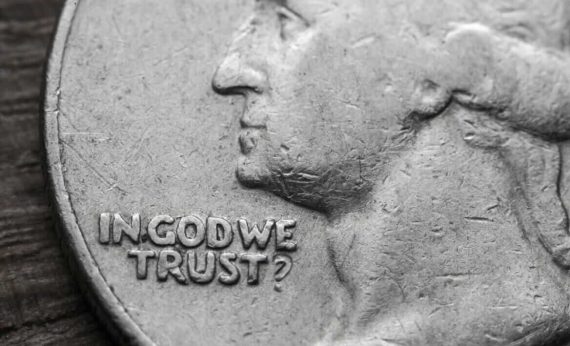Could the 2008 financial bust have been avoided? What about the Great Depression in 1929? If we were to travel back in time and revamp our entire financial system, we would see that the answer to these questions would be in the affirmative. Economic turmoil during these times led to a boom in poverty, crime, and suicide rates while wages of those fortunate enough to hold their jobs plummeted. Here is my argument: the arrogance of those who do not abide by God-given moral principles played a significant role in the economy’s malfunctioning and continues to do so today. Particularly in the West, we have the essential ingredients for a healthy economy save one: faith. Without a moral standard to base economic decisions on, the entire system is flawed in its core. Whether it’s national debt, health care costs, or income disparities, the crux of these issues is the lack of religious obedience.
The most obvious threat to the functioning of the economy is usury (interest). Rather than issuing interest rate hikes like the one looming ahead of us this year, the Federal Reserve should direct itself at discouraging all shades of interest-bearing financial transactions. With Donald Trump calling the shots, more people are speaking up about wealth disparity with the fear that his “trickle down” policies will expand this gap. There is no better time than now to act. In order to solve economic inequality, transactions resulting in wealth disparity must be eliminated all together.
The Abrahamic religions have coinciding principles prohibiting usury. In the Qur’an, God highlights the gravity of the sin stating “Those who consume interest cannot stand [on the Day of Resurrection] except as one stands who is being beaten by Satan into insanity” (Baqarah 2:275). Similarly, the Bible discourages usury expressing, “He does not put out his money at interest, nor does he take a bribe against the innocent. He who does these things will never be shaken” (Psalm 15:5). The Torah is also in agreement declaring, “If you lend money to any of my people, even to the poor with thee, thou shalt not be to him as a creditor; neither shalt thou lay upon him interest” (Exodus 22:24). As we can see, there are clear religious laws establishing the rightful use of money. The bottom line is that the religions strictly forbid the payment or receipt of interest.
Characterized by core principles such as risk sharing, transparency, and equity-based investments, the Islamic banking sector sets a great example for Western establishments. For instance, risk mitigation and profit-loss sharing are practices that contribute to economic stability. These ground rules prevent unjust distribution of income. This is not to say the Islamic banking system in today’s world is perfect. Financial scenarios can become complicated even for the top ranking Islamic banks. This is especially the case for sharia-compliant financial institutions in the U.S. and U.K., which pit the small albeit growing number of Islamic institutions against their conventional counterparts.
The lack of a central Sharia-board to seek guidance from complicates matters further. Because each bank has its own religious body, disagreements between managers across institutions are common. Consequently, the burden is put on the investor to make sure the transactions are in fact permissible. Investors must exercise caution before trusting banks with their money.
Although Islamic finance accounts for less than 2% of global assets, the growth rate exponentially surpasses other systems. The 2008 financial crisis was the moment the rubber met the road for Islamic banks. Due to their inherent stability, the crisis had very little implications for them (with majority increasing their gains) and many non-Islamic banks took note. Since then, Islamic finance has shown promising growth to the extent that a multitude of conventional institutions began offering sharia-compliant products and services, including renowned names such as Bank of America, Goldman Sachs, HSBC, J.P. Morgan Chase, and Merrill Lynch.
The U.K has been on the forefront of these developments. London-based Barclays is reaping financial rewards of its agreements with Muslim countries in the Middle East. These services are not limited to Muslims. A substantial number of non-Muslims have utilized such services, profiting all those involved. Countries like Malaysia have a 1:1 ratio of Muslims and non-Muslims using Islamic services.
Why should Muslims strictly prefer Islamic institutions? For one, there is a potential that the non-Islamic banks’ proceeds regardless of the services offered will be used for prohibited activities. A core financial principle of sharia law is that all transactions must result in the greater well being of the economy and its constituents. Western institutions often ignore this big picture view, as do their uninformed investors. Before becoming involved in any type transaction, including sharia-compliant ones, Muslims should be aware of the bank’s entire structure. The second issue is the degree of interest paid or received. This applies to both conventional institutions and less conservative Islamic banks.
Even though it has long been accepted that usury is religiously prohibited, recent views apply this restriction only to unreasonably high interest rates. This split has raised a philosophical debate. What is considered to be an acceptable range? Who decides what is excessive? The lack of answers to these and similar questions underscores an important fact. Today’s dynamic realm does not permit the payment or receipt of interest in a lawful manner. One can argue about the right interest rate, like the Federal Reserve, and provide supporting evidence, but this will come at an unnecessary cost.
Recommended
Abiding Muslims, Jews, and Christians alike accept that any form of interest is a sin without question. This is especially important for practicing Muslims who must make sure that any type of interest earned on their savings account is removed and donated to a charity. Simply removing the interest paid does not solve the problem, as the bank will end up using that money for its own conventional activities. Once again, these sensitive financial matters warrant great care on our part.
Prevalence of Islamic hedge funds is also on the rise resulting in understandably in more controversy than other investment vehicles. Hedge funds are infamous for their astounding profits made by questionable means. Immoral techniques for increasing profits are especially pervasive in this subdomain. Short selling, for instance is a popular strategy practiced by many managers contributing significantly to wealth inequality. Financial crashes including the one that began in 2007 were triggered by market declines resulting in investors selling stocks that were not owned by them (with the aim of purchasing them once prices decline).
If the price of the sold commodity does show the anticipated decline, the seller makes a profit and the buyer loses. This method where one party makes a profit from another’s loss is believed to have led to the 2008 crisis. The evidence was clear and the Security & Exchange Commission did not hesitate to put a temporary ban on short selling. Many financiers at the time, especially hedge fund managers were left with their hands tied as the economy slowly recovered. Islamic hedge funds however, were unscathed because of their alternative practices. If mainstream hedge funds had followed this way, many of them would have survived the crash. Once again, the prohibition of short selling is not limited to Islam. The law is in accord with St. Thomas Aquinas’s view that “it is a case of selling what is non-existent; and that is manifestly the setting up of an inequality contrary to justice” (Summa Theologica, (Vol. 2; London: Burns and Oates, 1892).
Muslim hedge fund managers have an ever-tougher job nevertheless. With the hedge fund industry’s negative reputation, gaining the trust of fellow Muslims is not easy. Communicating and offering transparency are critical. Educating investors is another need. In essence, hedge funds are not necessarily un-Islamic. In fact, the notion of avoiding gharar, excessive risk, is synonymous with “hedging” of risk. So how do Islamic hedge funds avoid practices that are unlawful? Some managers devise contracts where they are bound to purchase and sell a commodity within a limited time. Other alternatives include use of algorithms to engage in trading activity without shorting.
A different albeit less convenient strategy such as predictive modeling can achieve comparable results. With knowledge of quantitative finance, hedge funds can operate in a fully sharia-compliant manner. As Muslims who put God first, we must be willing to go the extra mile. Science is God’s gift and we must use it to benefit our society whenever we can. It is unacceptable for a Muslim to ignore these alternative faith-based strategies and resort to methods like short selling.
Before we try to tackle rooted problems like usury or short selling, perhaps it would be best to remove power from the hands of the people who take advantage of such strategies solely for their own benefit. The most brutal consequence of such injustice is evidenced in the health care sector. No individual deserves to suffer because they can’t afford health care services or medication. We recently saw a sad example of this in the pharmaceutical industry in the United States. Less than two years ago, CEO of Turing Pharmaceuticals, Martin Shkreli was charged for raising the price of a lifesaving drug by more than a shocking 5,000%. A single pill of Daraprim that cost about $14 was now priced at $750. In an interview during the Forbes HealthCare Summit the same month of his criminal indictment, the ruthless 32-year-old made a statement about wanting to raise drug prices even more. Investors, many of whom were defrauded by Shkreli, were outraged, as were the public.
Unfortunately, this is just one example of the reprehensible schemes plotted by the misguided in the financial industry. Without a feeling of accountability to God, executives are especially susceptible to becoming the victims of their ego (nafs). Little do they know, righteousness and fairness foster economic well being in ways that are incomparable to the profits in their bank accounts. Indeed, those who are vigilant will prevail in the long run. Prophet Muhammad (salla Allahu ‘alayhi wa sallam) asks for God’s mercy to one “who is kind when he sells, when he buys, and when he makes a claim” (Sahih al-Bukhari). A religious lifestyle has no tolerance for greed, let alone the kind of corruption that patients and their families have been subjected to by lost souls like Shkreli. Watching him shamelessly defend his tactics on various media outlets was hard to believe. It did, however, bring awareness to the dangers of immoral financial decisions and the corruption within the system. Tedious regulation is necessary to prevent these types of events from taking place, especially when the matter involves a human being’s life. Patients must always come first.
The economy’s infrastructure is flawed in a fundamental way making it susceptible to more and more instability. Justice in financial matters is a cornerstone for a flourishing economy. In a world where the affluent are easily making millions, while homeless shelters are brimming with veterans something needs to change. In our economic pursuits, we must not forget moral principles. For those who have, it is never too late to remember, repent, and redeem our economy.





